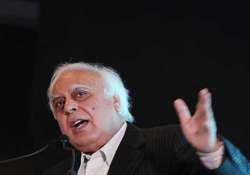IPL spot-fixing: Govt rules out interference in BCCI
New Delhi, May 27: Notwithstanding questions over BCCI in the wake of IPL spot-fixing, government has ruled out interference with it unless it “becomes absolutely necessary” but insists that the cricketing body should have “transparent”

New Delhi, May 27: Notwithstanding questions over BCCI in the wake of IPL spot-fixing, government has ruled out interference with it unless it “becomes absolutely necessary” but insists that the cricketing body should have “transparent” and “objective” systems in place to prevent malpractices.
Law Minister Kapil Sibal said the government should keep away from sports “as far as possible” as it could damage it.
“Sports can't be run by governments...governments getting involved in sports activities would ultimately damage sports,” he told PTI in an interview here.
He was responding to a question as to whether government should step into the affairs of the Board of Control for Cricket in India as questions are being raised over its functioning in the wake of spot-fixing allegations.
“I am not saying that in every situation, but as far as possible government should keep away. But when it becomes absolutely necessary, then there is no way out, then of course at that time government can take a position,” he said.
To buttress his argument, he said sports bodies across the world like American baseball, American football and soccer leagues in Europe are not under government control.
Even within the country, Indian Olympic Association and the Hockey Federation are not under government control, he noted.
Sibal, a renowned lawyer, said sports organisations should be encouraged to find solutions for themselves. “If there are malpractices in sports, part of the solution lies in the organisations themselves taking a very strong view and cleaning up the mess from within,” the Law Minister underlined.
“I think it's the primary responsibility of the organisation and the federation itself to put systems in place which are transparent, which are objective so that there is no recurrence of malpractices like this,” he said.
When it was pointed out that there can be activities like match-fixing and spot-fixing in sports, Sibal said, “If there are criminal offences involved, the law should come into force.”
On demands for bringing BCCI under the ambit of Right to Information Act, Sibal said it was up to the Sports Ministry to take a call.
Former Sports Minister Ajay Maken had in December 2011 favoured bringing BCCI under RTI, arguing that there is “just and reasonable grounds” for this.
BCCI has been rejecting any such move, saying it is a private body and RTI applies only to government organisations or those supported financially by it.
The Sports Ministry under Maken had said that though BCCI receives no government funds directly, it gets “substantial indirect funding” from the government in the form of “concessions in income tax, customs duty, etc” and land at concessional rates for stadiums.
The BCCI is performing the functions “akin” to State and ‘public duties' by selecting national teams and representing India in international events, the Sports Ministry had said at that time.
Law Minister Kapil Sibal said the government should keep away from sports “as far as possible” as it could damage it.
“Sports can't be run by governments...governments getting involved in sports activities would ultimately damage sports,” he told PTI in an interview here.
He was responding to a question as to whether government should step into the affairs of the Board of Control for Cricket in India as questions are being raised over its functioning in the wake of spot-fixing allegations.
“I am not saying that in every situation, but as far as possible government should keep away. But when it becomes absolutely necessary, then there is no way out, then of course at that time government can take a position,” he said.
To buttress his argument, he said sports bodies across the world like American baseball, American football and soccer leagues in Europe are not under government control.
Even within the country, Indian Olympic Association and the Hockey Federation are not under government control, he noted.
Sibal, a renowned lawyer, said sports organisations should be encouraged to find solutions for themselves. “If there are malpractices in sports, part of the solution lies in the organisations themselves taking a very strong view and cleaning up the mess from within,” the Law Minister underlined.
“I think it's the primary responsibility of the organisation and the federation itself to put systems in place which are transparent, which are objective so that there is no recurrence of malpractices like this,” he said.
When it was pointed out that there can be activities like match-fixing and spot-fixing in sports, Sibal said, “If there are criminal offences involved, the law should come into force.”
On demands for bringing BCCI under the ambit of Right to Information Act, Sibal said it was up to the Sports Ministry to take a call.
Former Sports Minister Ajay Maken had in December 2011 favoured bringing BCCI under RTI, arguing that there is “just and reasonable grounds” for this.
BCCI has been rejecting any such move, saying it is a private body and RTI applies only to government organisations or those supported financially by it.
The Sports Ministry under Maken had said that though BCCI receives no government funds directly, it gets “substantial indirect funding” from the government in the form of “concessions in income tax, customs duty, etc” and land at concessional rates for stadiums.
The BCCI is performing the functions “akin” to State and ‘public duties' by selecting national teams and representing India in international events, the Sports Ministry had said at that time.